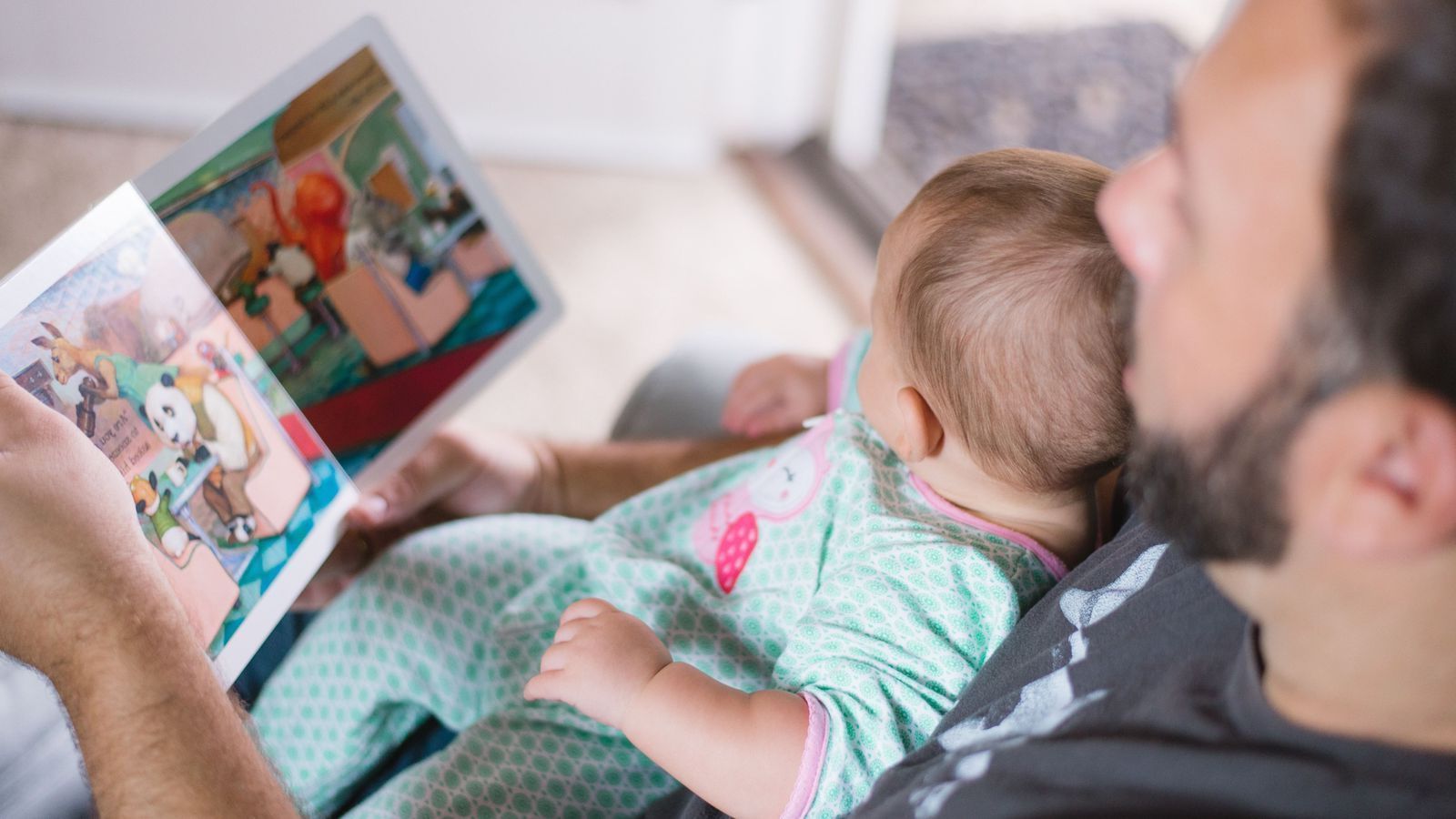Saying that parenting is a tough job is an understatement. After all, "jobs" are supposed to end when you clock out, and you know that being a parent is round-the-clock. Even the best parents make mistakes and are sometimes unsure they're doing the right thing.
Parenting is the most important job to be done in Nebraska communities, and as a parent, you're in the thick of it. There's plenty your community can do to support you to be the parent you want to be. There's also plenty that you can do to support yourself.
Protective Factors
Protective Factors are attributes in individuals and families that increase health and well-being. All families have protective factors. You’ve probably heard of “risk factors.” Protective Factors act as a buffer against risk factors and are even more important in predicting positive outcomes for children.
If you look at any strong, healthy family, you will see the Protective Factors. When things are going well, we are building the Protective Factors without thinking about it. But like many worthwhile things in life, living all of the Protective Factors takes practice. Basically, this means discovering the best ways to take care of yourself, be a strong parent, and build healthy family relationships.
Knowledge of Parenting and Child Development
Being a parent is part natural and part learned. Having a good understanding of how kids develop makes it easier to react positively to challenges like tantrums and defiance. Informed parents are more likely to have realistic expectations, provide appropriate guidance, and build a positive relationship with their kids.
What knowledge of parenting and child development looks like:
- Knowing the basics of what to expect at each stage of your child’s development
- Matching your expectations to fit your child’s stage of development
- Creating a supportive environment for each stage of your child’s development
- Managing child behavior through positive discipline techniques
- Recognizing and responding to your child’s specific needs
Tips for knowledge of parenting and child development:
- Ask your family doctor, child care teacher, family or friends about parenting or stages of child development
- Recognize that parenting our children like we were parented may come naturally but may not be what we want to repeat
- Take time to sit and observe what your child can and cannot do
- Share what you have learned with anyone who cares for your child
Nurturing and attachment means developing a pattern of positive interactions with your kids over time. Juggling the demands of work, home, and other responsibilities leaves many parents feeling like they do not have nearly enough time with their children. But even small acts of kindness, protection, and caring - hugs, a smile, or loving words - make a big difference to children.
What nurturing and attachment looks like:
- Recognizing that your child’s feelings and dignity matter
- Knowing that even when children are small, they have their own personalities, needs and ways of looking at things that you understand and respect
- Knowing what you have in common with each of your children and know how each of your children are different from you and from each other
- Listening ‘on purpose’ instead of only talking to your child or giving advice
- Lightening up and enjoying life and knowing what makes your child laugh
Tips for nurturing and attachment:
Spend time with each child and as a family whenever you can. Find activities you enjoy doing together
Commit to responding, instead of just reacting, to challenges from your child. Exercising the self-discipline and self-control we want our children to have begins with our own behavior. It requires practice!
Ask empowering questions of your child - questions that begin with Why? How? What? Then allow space for your child to find his/her own answers
Think about your best memories of family time and recreate those with your children or create new memories in time spent together
Here are some different ways to bond with your child through different stages:
Bonding with babies (Birth to 12 months)
Even though they are too young to understand you, talk to your child. Make eye contact, smile and make exaggerated faces as you converse. They’ll soon start to return the conversation with coos and happy shrieks. Hold your baby as often as you can. Rock your child to sleep and cuddle during the daytime.
Toddler time (1-3 years)
Between 1 and 3 years, toddlers want your attention more than anything. Give it to them! Reward their good behaviors – playing quietly, sharing with a sibling, being gentle with a pet, eating their food – with praise and attention. This will give your toddler the attention they crave and strengthen the bond between you.
Your toddler will start moving farther and farther away from you as they explore the world. When they come back, reward them with your attention and let your toddler know that they're safe and that you’re proud of them for exploring. Holding and snuggling are still great ways to bond at this age.
Preschool play (3-4 years)
Connect with your more independent 3- and 4-year-olds by playing with them. Hide and seek, tag and backyard races are great for active games. For quieter moments, play pretend with dinosaurs and dolls, build a blanket fort or create something with blocks. Encourage them to use their imagination!
Your preschooler loves snuggling and leaning against you while listening to a story – sometimes the same one over and over!
When your preschool child challenges you, and you hold firm, you reinforce the fact that he is safe and protected with you. It strengthens the bond!
School-age exploration (5-6 years)
Your child is starting kindergarten, getting involved in sports and activities, and becoming more involved in life outside your home at this age. Your child will be discovering new things and wanting to tell you about them.
Encourage them to talk about what they're learning in school with very specific questions. Instead of “How was school?” ask “What did you work on at your math station?” or “Tell me about this art project that was in your bag?” Giving your child a concrete question will elicit better answers.
Listen when your child is talking, and you’ll learn about some of the things that really interest him. Aside from just helping with homework, enjoy time doing the things that interest your child. He’ll know that he's important to you, and you’ll get the joy of watching his face light up because he’s doing something he really likes.
Parental Resilience
Parental resilience means being both strong and flexible. It is being able to manage stress and function well when you're facing challenges big and small. Your ability to bounce back from stress plays a huge role in how you respond to your kids and how they respond to you and others.
What parental resilience looks like:
- Resilience to general life stress
- Hope, optimism, self confidence
- Problem solving skills
- Self-care and willingness to ask for help
- Ability to manage negative emotions
- Resilience to parenting stress
- Not allowing stress to interfere with nurturing
- Positive attitude about parenting and child
Here are a few ways to keep your stress under control:
Time for you
You’ve heard this one before, but taking care of yourself will make you a better parent. This doesn’t have to mean an expensive spa day – go for a walk, have a cup of coffee in a quiet room, get a babysitter so you can go grocery shopping by yourself. Build in times when you can be alone with your thoughts and not being a care giver so your mind can recharge. You’ll find that you’re better at handing kid-related stress when you get some regular breaks.
Perspective
When it’s past dinner time, but the food’s not even in the oven and the homework isn’t done and the living room is a mess, it’s easy to feel overwhelmed. Think of a perspective phrase for these moments, like “Blessed” or “Perfectly Imperfect.” Call that phrase to mind when the little things are piling up. Close your eyes and think about the good in your life, and how these problems are not important.
Honesty
Some problems truly are small enough to shrug away. Some need to be dealt with. Financial, health and relationship problems can take a major toll on your own happiness and your ability to be the kind of parent you want to be. Deal honestly and directly with the real issues that are affecting your quality of life. Taking action to move in the right direction is usually less stressful than staying in an unhappy situation.
Make a plan
Sometimes the worst stress comes up when something unexpected does. Plan for what you can – have a schedule of how to get everyone out of the house in the morning. Pack lunches and backpacks the night before. Plan and shop for your weekly meals over the weekend – you can even make one or two meals ahead of time. Keep a big calendar in the kitchen of the family’s activities and spend a moment each morning looking at what’s coming up that day.
Have fun!
The occasional night out can do wonders for your stress level. But don’t forget the most powerful source of fun in your life – your kids! Take some tips from them on how to let go of your troubles. Spin around until you get dizzy. Have a dance party in the living room. Play Simon Says and charades. Laughing with the people you love most can reduce stress.
Social and Emotional Competence of Children
Your child develops social-emotional competence with your help. Basically, it means that children can manage their emotions, talk about their feelings and develop ways to solve problems in interactions with others. These skills are critical to success in school and life.
What social-emotional competence in children looks like:
- Children feel loved, believe they matter, and can figure out how to act according to the expectations of different environments, for example, home and classroom.
- Children take turns and share.
- Children are able to talk to their parents about their feelings and parents help children express their feeling through language rather than “acting out.”
- When a child’s behavior causes extra stress and frustration to the child or the parent, the parent asks for help. This might include talking with an experienced teacher or counselor.
Tips for social-emotional competence in children:
- Consider how your home feels from your child’s perspective. If needed, how can you make your home more peaceful?
- Set clear rules and limits, e.g., “people in our family don’t hurt each other.”
- Model empathy for others
- Know what social and emotional skills children typically do and do not have at different ages.
- Visit the Zero to Three website for tips and tools for infants and toddlers.
- Visit the Nebraska Family Helpline for information on child behavior problems or mental health needs. For crisis assistance on issues from bullying, drugs and thoughts of suicide to sharing and obedience issues, trained counselors are available 24/7 at 1-888-866-8660
Specific Strategies:
Early learning
Make sure your child is receiving high-quality early childhood education as soon as possible. For stay-at-home parents, this can mean partnering with a trained home visitor to share new ways to help your child with social-emotional skills.
Social learning
Kids who have ample time around other kids have more opportunities to practice their own people skills, like sharing, taking turns and having conversations. If your child isn’t in school, playdates, church groups, tumbling classes or trips to a park are great ways to make sure your child is connecting with others.
Behavior management
Every child has challenging behaviors from time to time. If you have concerns, ask your school or pediatrician for information or resources.
Social Connections
Social connections are positive relationships that provide emotional support and advice. Parents need friends. Having a network of social connections you can rely on is important for every family. This doesn’t mean that you have to have hundreds of people in your life – just a few people at each level will provide you with people to lean on, learn from and laugh with.
Spend time with people who make you feel good and distance yourself from people who tear you down. Be careful to include people who you trust to tell you the truth, not just to feed your ego. People on your go-to team keep you positive by contributing to you growing stronger, healthier, and more aware. They sometimes make you work to bring out the qualities that you value the most in yourself.
What social connections look like:
- Multiple friendships and supportive relationships with others
- Feeling respected and appreciated
- Accepting help from others, and giving help to others
- Skills for establishing and maintaining connections
Tips for social connections:
- Participate in family and neighborhood activities like pot luck dinners, picnics, or community get-togethers
- Join an activity at a local child care or family resource center
- Visit your child’s school resource fairs or attend a parent group meeting
Concrete Supports
Concrete supports mean having access to goods and services that address your family's needs. Your community provides concrete supports and services so that when things get tough, you have somewhere to turn for help. And everyone needs help sometimes.
What concrete supports look like:
- Seeking and receiving support for food, shelter, clothing, health and other services when needed
- Knowing what services are available and how to access them
- Adequate financial security; basic needs being met
- Advocating effectively for self and child to receive necessary help
Tips for concrete supports:
- Make a list of people to call or places to contact for support
- Ask the director of your child’s school to host a community resource night so you can see what your community offers
- Get to know and use the resources below:
- Nebraska Family Helpline
- Answers4Family to find service organizations and resources in your area
Information for Parents
General Websites:
American Academy of Pediatrics
https://www.healthychildren.org/ Comprehensive information (health, safety, child development, etc.) for parents of children from prenatal through young adult years. English and Spanish. APA also has tip sheets for parents, e.g. http://www.apa.org/topics/parenting/tip-tool-brochure.pdf
Boys Town Parenting
http://www.boystown.org/parenting/ Resources and guidance on how to successfully raise, praise, discipline, teach, and nurture your child.
Search Institute
http://www.parentfurther.org Information for parents of children ages 0-18.
Websites for Targeted Needs:
Nebraska Family Helpline
https://dhhs.ne.gov/Pages/Nebraska-Family-Helpline.aspx Answers to questions about children’s mental health and behavior. Resources and counselors available 24/7.
Answers4Families
http://www.answers4families.org/ Answers4Families.org is Nebraska’s support and information connection for families and professionals seeking assistance for family members with special needs.
Mobile Apps:
Text4baby
https://www.text4baby.org/ Free mobile app that sends text messages with information for parents expecting a child through the first year. English and Spanish.
Staying on Track
http://edn.ne.gov/cms/resources/staying-on-track-as-your-child-grows-and-learns Free mobile app available through iTunes (from Nebraska Early Development Network) that provides information on child development , safety, learning, child care and related for parents of children ages 0-3.
Vroom
Website to help parents build brains, http://www.joinvroom.org/. Videos are available at, https://www.youtube.com/user/joinvroom.





